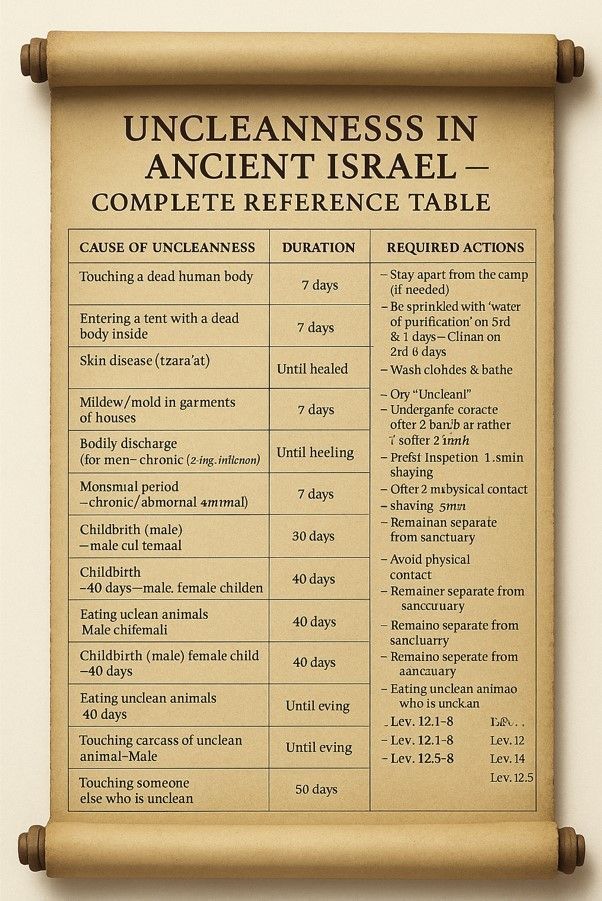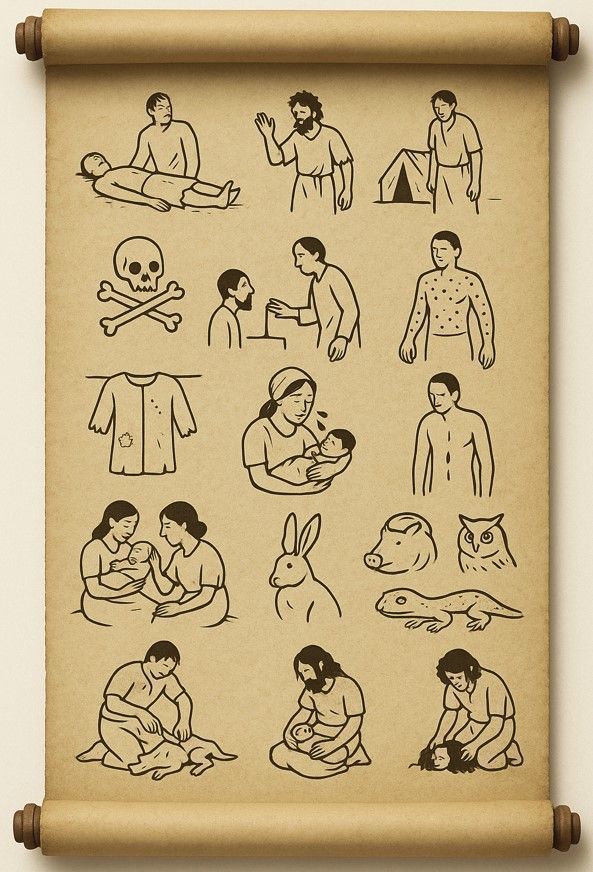In ancient Israel under the Law of Moses, an “unclean” person (טָמֵא tameʾ in Hebrew) was not necessarily sinful, but they were considered ritually impure—meaning they were temporarily barred from certain activities, especially entering the sanctuary or participating in community worship—until they followed the prescribed steps for purification.
The exact process depended on why they were #unclean.
General Rules for the Unclean
-
Separate from the camp or congregation
-
Numbers 5:2–3 — “Command the Israelites to send away from the camp anyone who has a defiling skin disease or a discharge of any kind, or who is ceremonially unclean because of a dead body.”
-
They were to live apart or avoid sacred areas until clean.
-
-
Avoid holy things
-
They could not touch holy objects, eat sacred offerings, or enter the tabernacle/temple until purified (Leviticus 7:20–21; Numbers 19:13).
-
-
Purification rituals
-
This could involve:
-
Washing body and clothes (Leviticus 15:5–11, 17).
-
Waiting until evening — often, after bathing, a person was clean “when the sun sets” (Leviticus 15:16).
-
Offering sacrifices for certain impurities (Leviticus 14:1–32 for skin disease, Leviticus 15:13–15 for bodily discharges).
-
Sprinkling with the “water of purification” made from the ashes of a red heifer, if defiled by a corpse (Numbers 19:9–21).
-
-
-
Inspection by a priest (for specific cases)
-
For skin disease (tzaraʿat) or mold contamination, the priest had to examine the person or house before declaring them clean (Leviticus 13–14).
-
Examples of Uncleanness and Prescribed Actions
| Cause of Uncleanness | What They Were to Do | Scripture |
|---|---|---|
| Touching a dead body | Stay outside the camp, be sprinkled on the 3rd & 7th day with red heifer water, wash, clean on 7th day | Num. 19:11–12 |
| Skin disease (tzaraʿat) | Live outside camp, wear torn clothes, call out “Unclean!”, later present self to priest, offer sacrifices | Lev. 13:45–46; Lev. 14 |
| Bodily discharge | Wash clothes/body, wait until evening; after healing, bring birds as sacrifice | Lev. 15:13–15 |
| Childbirth | Mother stayed separate for set days (40 for a boy, 80 for a girl), then brought offerings | Lev. 12:1–8 |
| Touching unclean animals | Wash clothes/body, unclean until evening | Lev. 11:24–28 |
Purpose
These laws were not just about hygiene but about symbolic holiness—teaching Israel that God is pure and His people must be separate from death, disease, and impurity. It also preserved health and prevented the spread of disease in the camp. See #Torah for more details on what God requires of us.
Uncleanness in Ancient Israel — Complete Reference Table
| Cause of Uncleanness | Duration | Required Actions | Scripture References |
|---|---|---|---|
| Touching a dead human body | 7 days | - Stay apart from the camp (if needed) - Be sprinkled with “water of purification” (ashes of red heifer + water) on 3rd & 7th days - Wash clothes & bathe - Clean on 7th day | Num. 19:11–12 |
| Entering a tent with a dead body inside | 7 days | Same as above — everyone in tent becomes unclean | Num. 19:14–15 |
| Contact with a human bone or grave | 7 days | Same as touching a dead body | Num. 19:16 |
| Skin disease (tzaraʿat) | Until healed + 7 days | - Live outside the camp - Wear torn clothes, uncover head, cover upper lip, cry “Unclean!” - After healing: priest inspection - Wash clothes, shave, bathe - Offer sacrifices (2 birds, lamb, grain, oil) | Lev. 13:45–46; Lev. 14:1–32 |
| Mildew/mold in garments or house | Until inspected & cleansed | - Priest inspects - If mildew spreads: burn garment or remove affected house stones - Purification ceremony with birds, cedar wood, scarlet yarn, hyssop | Lev. 13:47–59; Lev. 14:33–57 |
| Bodily discharge (men) — chronic (e.g., infection) | Duration of discharge + 7 days after | - Wash clothes & bathe - Avoid contact with people/holy items - After healing: offer 2 birds as sacrifice | Lev. 15:1–15 |
| Emission of semen {sex or masterbation} | Until evening | - Wash body and clothes - Unclean until sunset | Lev. 15:16–18 |
| Bodily discharge (women) — chronic/abnormal | Duration of discharge + 7 days after | - Wash clothes & bathe - Avoid contact with people/holy items - After healing: offer 2 birds as sacrifice | Lev. 15:25–30 |
| Menstrual period | 7 days | - Separate from physical contact - Wash clothes & bathe after period | Lev. 15:19–24 |
| Childbirth — male child | 40 days | - Remain separate from sanctuary - After days are complete: offer lamb & pigeon/dove (or 2 birds if poor) | Lev. 12:1–8 |
| Childbirth — female child | 80 days | Same as above | Lev. 12:5–8 |
| Eating unclean animals | Until evening | - Wash clothes & bathe - Unclean until sunset | Lev. 11:24–28, 39–40 |
| Touching carcass of unclean animal | Until evening | - Wash clothes & bathe - Unclean until sunset | Lev. 11:24–31 |
| Touching someone else who is unclean | Until evening | - Wash clothes & bathe - Unclean until sunset | Lev. 15:7, 19–22 |

Human excrement was considered something that defiled and had to be handled carefully in ancient Israel, though it was not usually labeled with the same Hebrew word tameʾ (“unclean”) used for ritual impurity from things like corpses or skin disease.
It was more in the category of uncleanliness in the sense of filth that could offend God’s presence.
Instructions Regarding Excrement
-
Outside the Camp
-
Deuteronomy 23:12–14 — The Israelites were commanded to designate a place outside the camp for relieving themselves.
-
They had to carry a tool (a paddle) to dig a hole, bury the waste, and cover it.
-
Reason: Because Yehovah walked among them, the camp was to remain holy, and offensive things could not be left exposed.
-
-
Symbolic and Practical Purposes
-
Hygiene — Preventing disease in a tightly packed camp.
-
Holiness — Anything filthy or shameful was not to remain in God’s dwelling place among His people.
-
Separation — Like other impurities, excrement was to be kept apart from the congregation and sacred space.
-
-
Related Impurity Cases
-
Contact with human or animal waste was considered defiling in the broader sense (requiring washing), though not listed in Leviticus 11–15 as a formal ritual impurity category.
-
Ezekiel 4:12–15 mentions human dung as unclean for cooking fuel, showing it was symbolically defiling.
-
Summary:
Human excrement was not a “ritual impurity” like touching a dead body, but it was treated as an unclean and defiling substance that had to be kept away from the camp and buried, both for health and holiness reasons.
